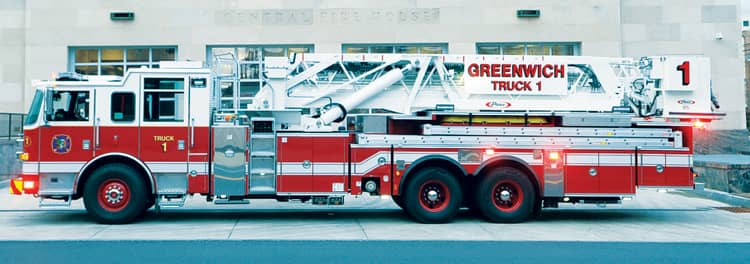

By Richard Kaufman
An agreement on a new labor contract between the town of Greenwich and its firefighters has finally been approved after a lengthy three-year process.
Negotiations had entered arbitration almost two-and-a-half years ago, but an agreement was able to be reached before an arbitrator needed to hand down a decision.
“Any time you have to have an arbitrator render a decision, it’s difficult because sometimes there’s not clarity in a decision and it creates more problems. Being able to settle outside arbitration is a benefit for the town side and the firefighters union,” said Greenwich Fire Department Chief, Peter Siecienski.
On April 16, the Representative Town Meeting voted 148 to 47 with three abstentions to indefinitely postpone consideration of the agreement. Essentially, if the RTM fails to reject the agenda item within a certain number of days after the parties have agreed on a contract, the contract automatically takes effect.
The four-year contract with International Association of Firefighters Local 1042, Greenwich’s firefighter union, which consists of 102 firefighters, lieutenants, deputy chiefs and shift commanders, and the Fire Marshal and Training Division, is retroactive to July 1, 2015, and runs through June 30, 2019.
The contract features a wage increase of 2.5 percent in each of the first two years (retroactive), a 2.25 percent increase this year (FY 2017-2018), and a 1.5 percent increase for next year. Beginning on July 1, firefighters will be transferred over to the state’s healthcare plan from the town’s plan which should save the town a considerable amount of money. The firefighters are the last bargaining unit in town to make the transition.
Usually, negotiations on a new labor contract begin earlier in the year in which they will expire. In this case, negotiations between the union and the town began in January of 2015, but reached an impasse because there was debate on whether or not staffing could be negotiated as part of the pact.
A separate arbitration case subsequently ruled that staffing could be discussed since it was a health and safety issue.
“What we did was we used the existing staffing that we had within the department, and we equalized the staffing on each engine company so that where we had a mixture of two-person engines and four-person engines, we now have three-person engines out there. That’s consistent with our peer communities,” Siecienski said, noting that change in staffing was good to have on the fire union side, because it eliminates a lot of the hazards that a two-person company would encounter when they first arrive on scene.
“It doesn’t increase the staffing levels for the town. It doesn’t require any additional headcount to be hired. It doesn’t require any additional overtime. It’s just a reallocation of resources to equalize the town,” Siecienski continued.
Once it was deemed that staffing could be negotiated in 2016, the town and the union were able to proceed with negotiations before ultimately coming to an agreement.
Along with firefighters moving over to the state’s healthcare plan, Siecienski said that the ability to achieve what’s called “payroll lag” was an important get for the town. This allows the fire department’s payroll to be current with all employees in town.
David Detjen, Chairman of the RTM’s Labor Contracts Committee, said the 2.5 percent increase in wages retroactive to the first two years of the contract is similar to what the town had previously negotiated with the police.
For this fiscal year and the next, the town modeled the wage increases of 2.25 and 1.5 percent respectively after what the Teamsters Local 456 was awarded in arbitration after the RTM rejected their contract in Dec. of 2016.
“The 1.5 percent is definitely on the low side. That definitely is a gain for the town, and that is based upon what came out of the teamsters arbitration,” Detjen said. “When you look at the wage levels for Greenwich firefighters in relation to other towns, the base wage of the firemen is more or less in the middle third for Fairfield County.”
However, most Greenwich firemen receive stipends for additional lifesaving training. “When you add in those stipends that most of the firemen are now getting, then Greenwich is right up there, either No. 1 or No. 2 in Fairfield County,” Detjen said.
Siecienski called the contract fair, and said it’s nice to put the negotiations in the past.
“It’s an agreement that nobody is standing up and shouting hurrah for. The union guys aren’t sitting there saying ‘yippee.’ And, certainly from our side, the town isn’t jumping up and down, so to me, that means it’s a fair contract. It protects a lot of interests on both sides,” he said.
Siecienski credited his firefighters with continuing to work essentially without a contract for three years.
“I can honestly say, I give the firefighters credit for the three years plus they were without a contract. You’d never know they were working without a contract,” he said. “They were nothing but professional out there. They showed the same compassion to go through anything they could to make somebody’s day better, and they never a moaned or groaned that they didn’t have a contract for three years.”
First Selectman, Peter Tesei, who is the town’s fire commissioner, said it was best for all parties involved to come to an agreement on their own.
“After nearly two-and-a-half years of arbitration, it was in the best interest of the taxpayers, firefighters and the Town that the parties were able to find some common ground which formed the basis for a negotiated agreement,” he said.
Since the new firefighter contract is set to expire in the summer of 2019, the union and the town will have to strike up negotiations for the next pact in the not-so-distant future.





